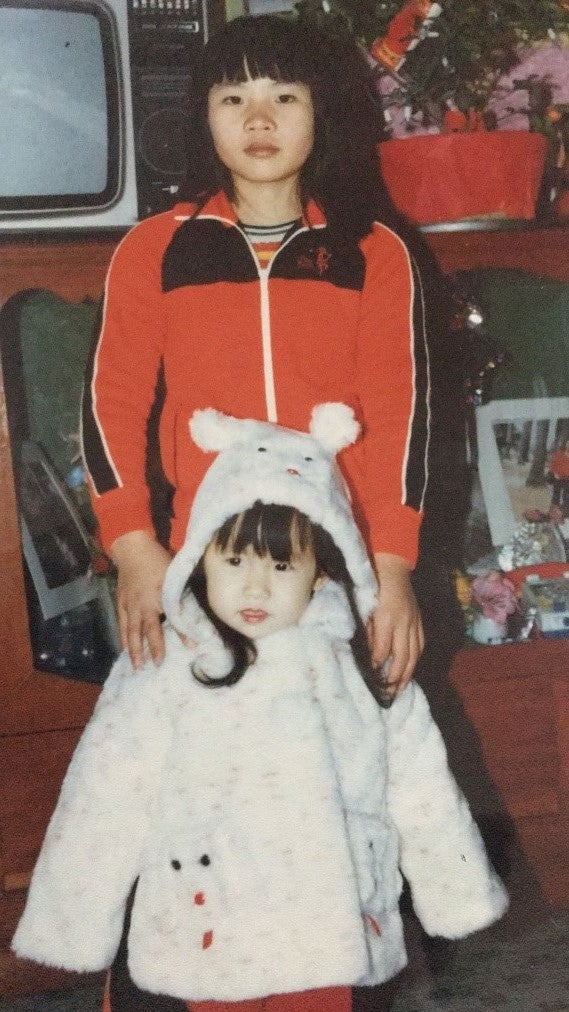
Jenny in Zhongshan. She was about 13 years old in the photo
Jenny Liu (劉浣玲) was born in Shuchong village of Zhongshan in 1972. She migrated to Sydney in 1988 with her parents and two brothers when she was 15 years old. Her father was a chef and worked in Costa Rica for ten years in the 1970s before he migrated to Australia with his family. Jenny’s extended family has a long history of migration. Her great grandfather came to Queensland in the early 20th century, but eventually returned to China to get married. Two of her grand-uncles moved to Hong Kong, while her grand aunt (her father’s aunt) lives in Sydney. Jenny’s aunt (the sister of Jenny’s father) operated a grocery store in Costa Rica and sponsored her father to work there before she finally settled in the US. Jenny’s extended family is now spread across different continents, in the US, Canada, the UK, Australia, China, Macau and Hong Kong.
Jenny’s father migrated to Australia as a skilled migrant (a chef) as he wanted his family to have a better life. When Jenny first arrived in Sydney, she knew very little English. She took English class at an Intensive English Centre in Holroyd before entering a mainstream high school to study Year 8. She said, ‘At that time it’s really hard, you have no friends…Oh no, I don’t want to stay there’. At the Intensive English Centre, she began to make many friends who also came from non-English speaking backgrounds, such as migrants from Hong Kong, Malaysia, Vietnam and Eastern Europe. After she finished high school, Jenny went on to study accounting at a TAFE (Technical and Further Education) Institute and worked as an accountant until she started her own business.
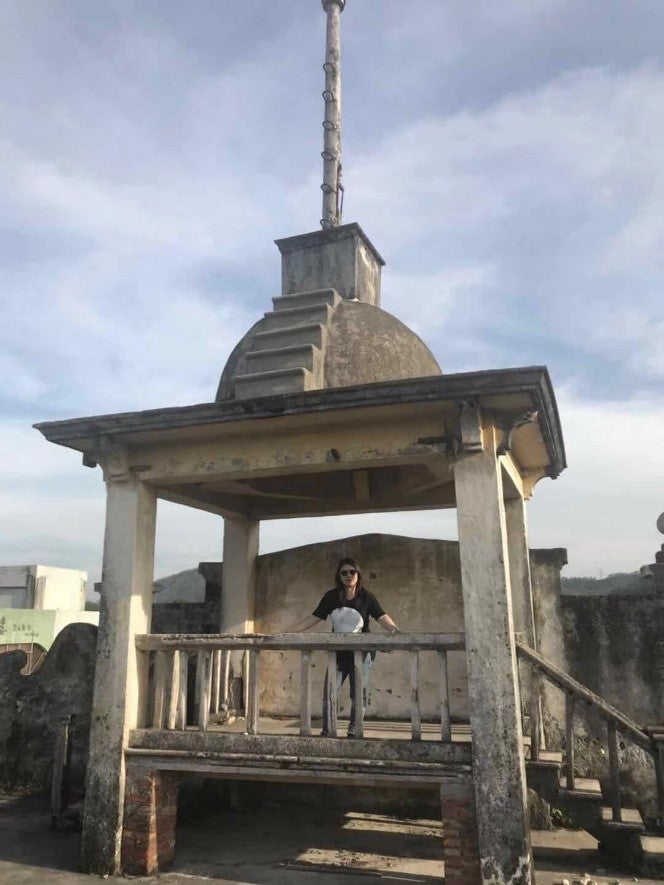
Jenny studied at Caobian School before she migrated to Sydney. This photo was taken during her trip to Zhongshan in 2017.
Jenny’s husband Ben Liang (梁吉华) was her childhood friend from a neighbouring village in Zhongshan, Caobian. After they got married, Ben joined Jenny in Sydney in 2006. Ben was a policeman in Zhongshan, but he re-trained to become a chef of Chinese style barbecue meat with a famous Sydney chef, who sold them his Chinese BBQ meat and noodle stall ‘Fung Shing Gourmet’ in Sussex Centre’s food court in Chinatown. Jenny and Ben continued to operate the Sussex Centre food stall for about ten years until 2014. They then sold the business as they wanted to make a change in their lifestyle and devote more time to their family.
After Jenny and Ben sold their business, they spent three months in Zhongshan, visiting their families and friends and planning for their future. After their return to Sydney, Jenny and Ben started their new café restaurant ‘Yummy One’ in 2014 in Quay Street near Chinatown. Their restaurant offers Pan-Asian cuisines, such as Hong Kong and Malaysian food. The main clientele of their restaurant are mostly Asian students from the University of Technology Sydney (UTS) and its foundation college, UTS InSearch Institute. Jenny and Ben now work two days a week at their restaurant, while hiring other chef and staff to work for them. Jenny, Ben and their two children travel to Zhongshan every year, usually during their children’s summer holiday in Sydney (December to January) to visit Ben’s parents and friends in Caobian village.
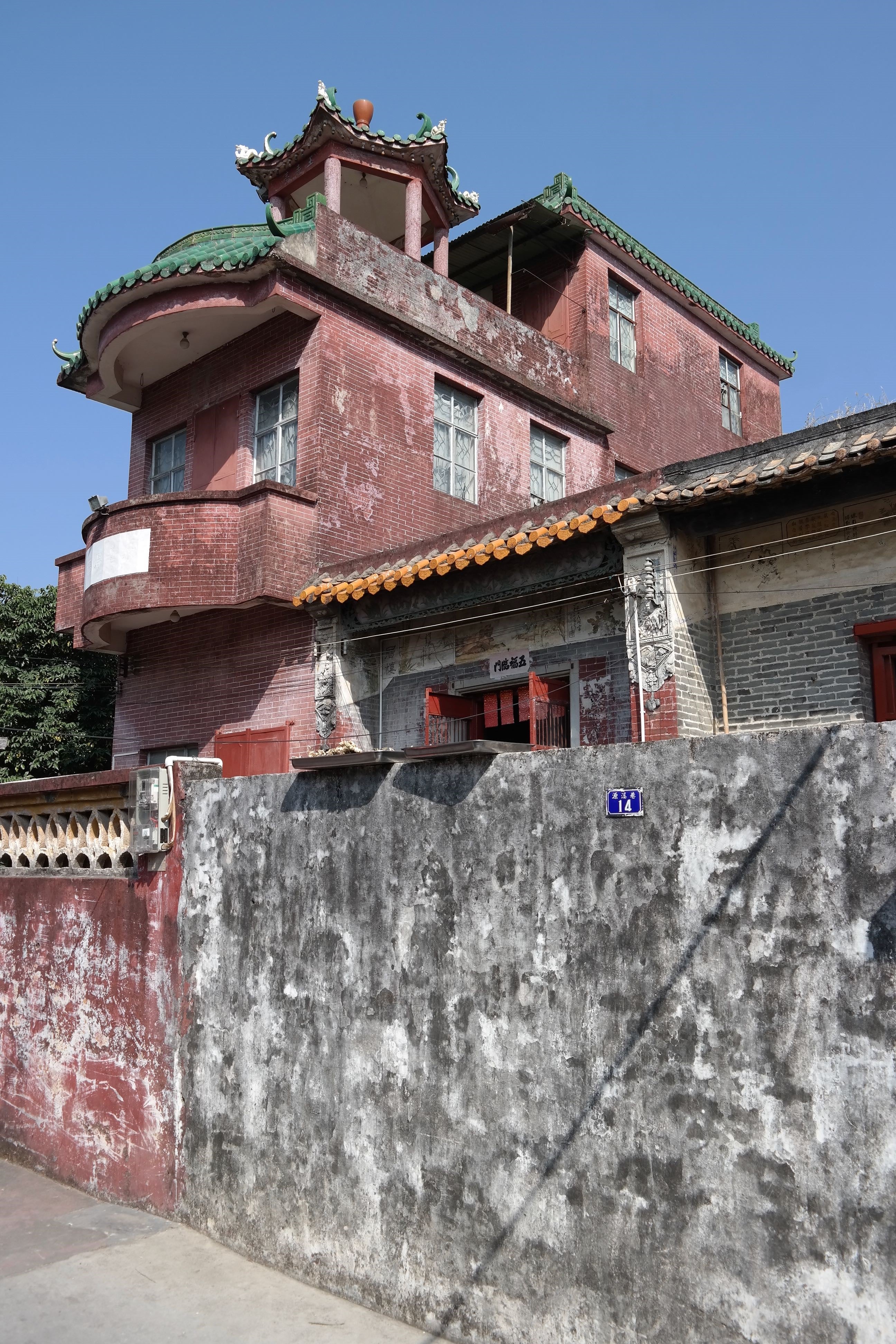
Jenny and her family stay in the house of Ben's parents in Caobian (2017)
Australia-China connections
Jenny admits that when she first moved to Sydney, she missed her village Shuchong very much. She kept writing letters and making phone calls (with phone cards) to her friends in the village. Gradually, she adapted to her new life in Sydney, as she said, ‘after a few years, you make friends here, and you start your new life. You just get on.’ Now, Jenny does not maintain a very close connection with Shuchong village, as she sees Sydney as her ‘home’ now, although she still goes back to Zhongshan every year to visit her husband’s parents and friends.
Jenny feels she has less and less attachment to her ancestral village, as all the members of her family have already moved out. She said, ‘What’s the point, you’ve come back and you don’t know anyone.’ Jenny’s extended family still has four to five houses in Shuchong (including one belonging to her father), but since all her family members have moved out and hardly return to the village, all the houses have been left vacant.
Compared to Jenny, Ben has a stronger connection with his ancestral village Caobian, mostly because his parents and many of his friends are still living in the village. Ben still donates money to the ancestral hall in Caobian village and is in the process of applying for approval from the village council to re-build his ancestral house in the village for his father. He even considers moving back to Zhongshan after his retirement, although Jenny would very much object this idea.
Jenny’s father is a member of the Chung Shan Society of Australia. Jenny had persuaded him to join the Society after his retirement, as she thought her father could join the events or trips organised by the Society with the other fellow Zhongshanese. Jenny’s father still goes to Shuchong village about once a year, usually around Ching Ming Festival (in April) to pay respect to his ancestor’s graves. Similar to Jenny, her father also considers Sydney as his ‘home’ now.
Return Journeys
The first time when Jenny returned to Zhongshan was in 1998, about ten years after she migrated to Sydney. She explained that it was because air fares were very expensive at that time and she could only afford going back after she finally got a job.
Describing her experiences of going back, Jenny said, ‘the first time I went back, because I still got a great grand mum there, I could still feel that ‘Oh, it’s home’, like coming back home. But because she has passed away and then all my aunties now live in Macau …the last few times I went back to my own village, I don’t recognise the people any more, the old people have passed away already…’
Despite this, Jenny still returns to Zhongshan every year, mainly to visit her husband Ben’s parents and friends in Caobian village. She also wants her two children to learn about the traditional Chinese values, such as the importance of family and being respectful to seniors. Jenny admits that the length of their stay in Zhongshan is getting shorter and shorter, as she and her children want to travel to other destinations rather than just staying in the village.
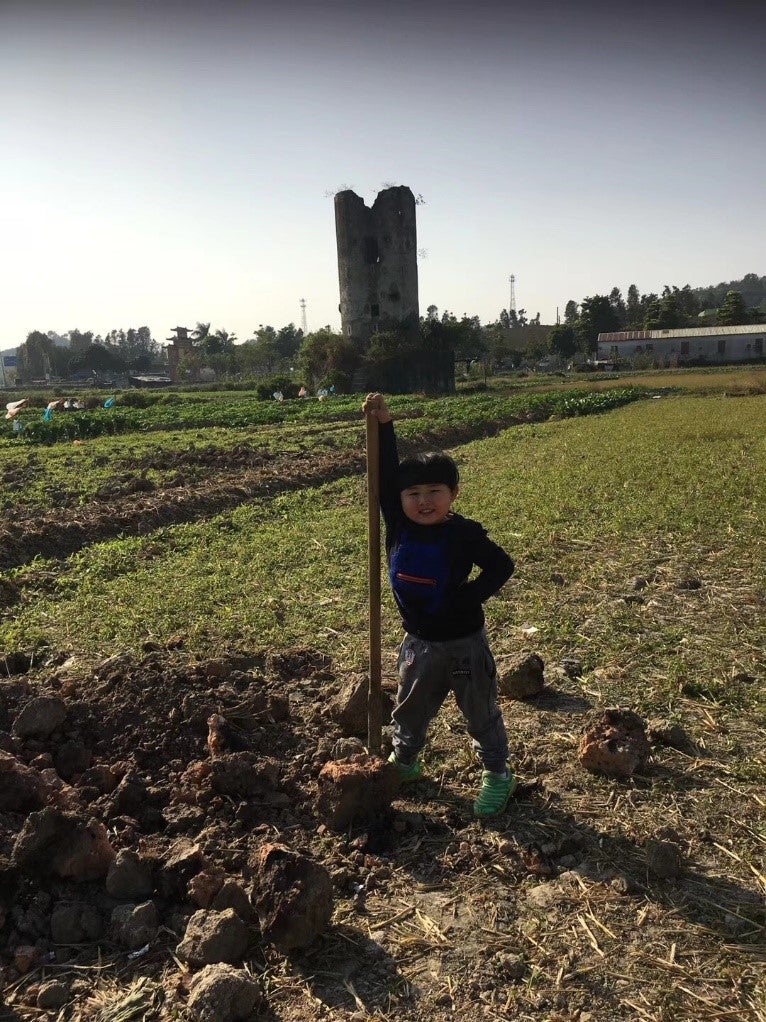
Jenny takes her children to Zhongshan every year to visit her in-laws in Caobian village.
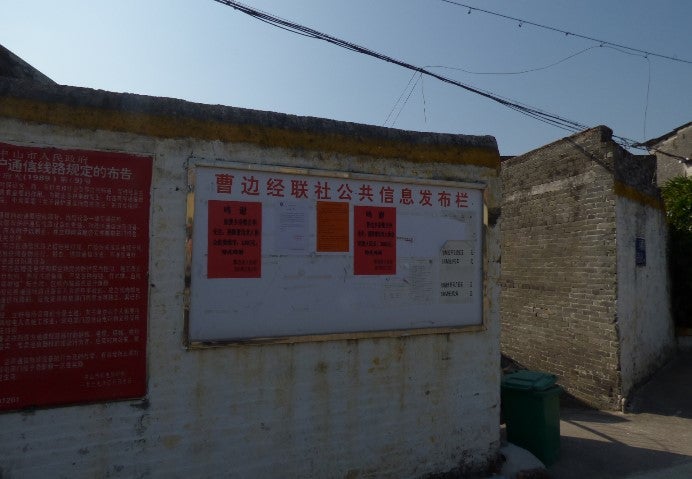
Jenny’s husband donated RMB1000 to the village for elderly activities as shown on the noticeboard (2017)
Talking about her more recent trips, Jenny does not seem to enjoy returning to Zhongshan very much as she finds staying in the village ‘boring’. Jenny also feels a sense of loss about the changes in her village, especially the change of language spoken in Zhongshan. In her words, ‘The majority of people spoke Cantonese in the 80s, 90s, but now in Zhongshan, Mandarin is the main language…You just feel like it’s not Guangdong anymore because people talk to you in Mandarin’.
Moreover, Jenny feels some wariness when she travels outside the village. For instance, she is unwilling to go to Shekki (Zhongshan’s city centre) with her children without a car driven by a family member. She said, ‘You just feel like you’re not safe, to go out without knowing the area… [The city] has been changed so quickly, too quickly’.
